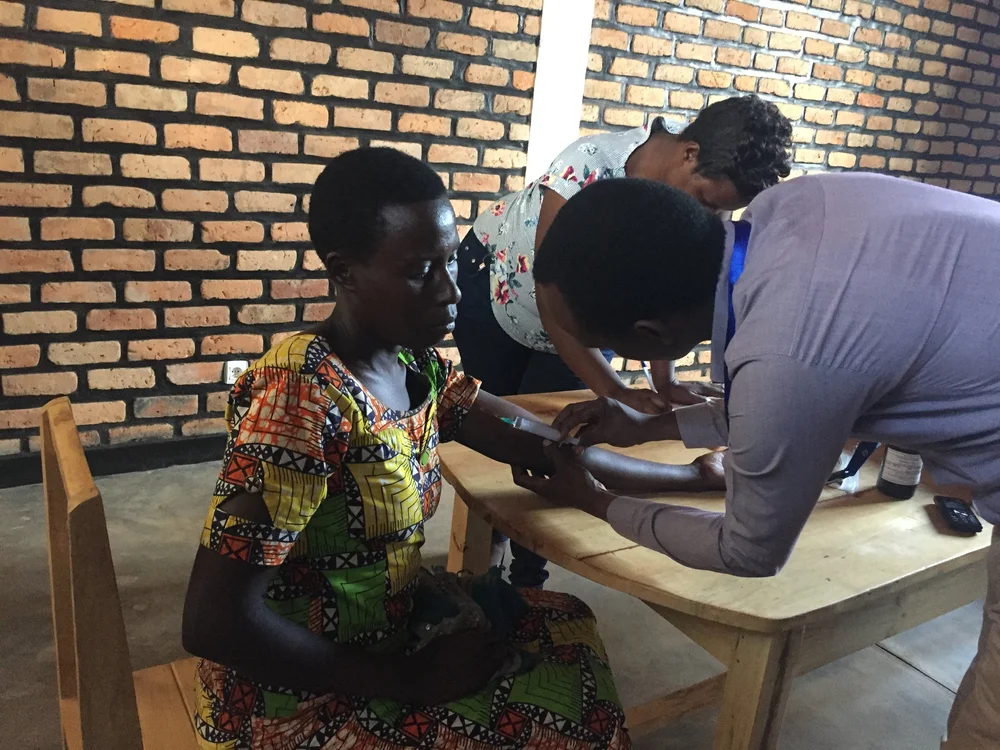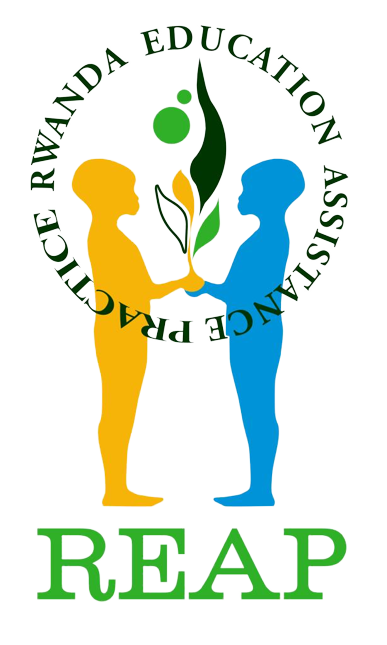

REAP believes that the success of children — and the quality of their education — and the strength of a community depend upon each other in order to break the cycle of poverty and generate opportunities for lifelong learning.
REAP’s programs target children and their parents, the Duha Complex Public School, and the surrounding communities of Duha and Akabare. By focusing on a rural area of 7,000 people, we are creating the conditions to reweave the fabric of these communities.

The Community Learning Center and Library (CLCL) — close to the Duha school and at the crossroads of the village of Musha — maximizes the participation of students, parents, and the surrounding community. The center is designed as a convening place to promote community-driven homegrown solutions such as Friends of Family to deal with family conflict, Community Health Workers to increase access to health care, and the Village Kitchen to alleviate malnutrition and stunting.
Our REAP farm at the CLCL is a community vegetable and fruit garden that our REAP agronomist manages. It is a model of modern and productive farming techniques. The farm helps to create a more sustainable approach to farming by providing seedlings to community members who can readily plant them in their small plots of land to generate a quicker, healthier harvest. The farm also produces food that supplements balanced meals for the nutrition program. REAP also initiated a vegetable garden at the Duha School which supports the feeding of the students for the past six years.
This weekly three-hour meeting is an open invitation to all parents in the community. We host discussions around household issues like marital conflict, domestic violence, alcoholism, childrens’ rights, micro-savings, and circumstances that affect a family’s well-being. The community selects parent volunteers who take turns facilitating. REAP staff occassionally run workshops on skills that include effective group facilitation and community mobilization.
a. Business Leadership club to help male and female students create and run businesses and entrepreneurial projects to help generate income and prepare for life after school.
b.Musha Alumni Club helps high school graduates with technology, internet and employable skills at the REAP’s CLCL.
These grassroots groups increase savings and provide loans for food, cattle, clothes and health insurance to strengthen economic and social wellbeing.
Parents and students who participate in REAP’s programs partake in monthly Umuganda activities (a practice from Rwandan culture of self-help and cooperation) at both the CLCL and Ihuriro Community Center. The activities include work on the farm, story telling, cleaning, gardening, and assisting in classroom learning activities. After Umuganda, a government official or our community organizer leads a discussion on government-initiated civic programs.


The SEED project (Strengthening Entrepreneurship, Equity, and Dignity), supported by a start-up grant from the U.S. Embassy, reinforces the spirit of community resilience and leadership. From the ashes of an abandoned building, REAP is assisting the renovation of this site, activating a sewing cooperative, addressing the need for sustainable sanitary napkins, and raising gender equity. The program includes five integrative components sequenced over three years:
REAP, in partnership with local Rwandan government representatives, has formed a board of 12 volunteer community members and Duha School teachers. The board meets at least twice a month at the CLCL and reports to REAP and the government. Volunteers design and implement community mobilization efforts at the CLCL as well as ensuring the center’s security and maintenance.
I. Basketball
In 2017, REAP and Duha Complex School came together to make the students’ dreams a reality by installing a basketball court at the school. In 2019, the Duha Girls’ Basketball Team placed first in the Rwamagana District, containing 77 schools. The Duha Girls’ team dethroned the reigning champions, who held the title for three years in a row
II.Girl Guides
REAP recognizes the obstacles Rwandan girls face and strives to build their leadership skills. In that regard, REAP offers several programs, including Girl Guides, which teaches entrepreneurial and leadership skills. Girl guides raise and sell piglets to move toward financial independence and to develop business skills.
III. Tuseme “Let’s speak out” Club
The club comprises boys and girls who uses drama and theater to speak out, raise awareness and address issues hindering girls social and academic success.
IV. Sexual and Reproductive Health Club
The club educates students and the community about sexual and reproductive health. The club also ensure girls on campus have access and use the girls (in day schools a room with bathroom, supplies, painkillers and a bed for girls’ room in menstruation) in collaboration with teacher mentors.
V.Girls Leading Our World (G.L.O.W) Club
In collaboration with Ready for Reading, Global G.L.O.W and LitWorld, INEZA Community Learning Center and Library is home to a mentorship program for girls. The mentor, working as a full-time librarian at the CLCL for the next two years, will ensure girls have equitable access the resources in the REAP Library. Additionally, training and programs deepen self-esteem, foster self-advocacy, and increase access to economic opportunity through technolical and financial literacy. With a holistic approach to physical and mental health, the program supports girls as they come to explore themselves and their community.

REAP recognizes and addresses the myriad socio-economic factors that have an impact on community-members’ well being.

REAP received a grant from the US Department’s Citizen Diplomacy Action Fund Rapid Response in 2020 that focused on addressing the need for accurate information about COVID-19 as well as ways to prevent its spread.
Called Kalendari INEZA, the project brought together community members along with the Musha Health Center to create 24 public health messages (2 for each month). Accompanying each message and month, children drew pictures to illustrate the messages.

MEDIATRICE, A NURSE FROM MUSHA HEALTH CENTER DEMONSTRATES PROPER HAND WASHING
REAP engages the community in sexual and reproductive health campaigns through student clubs. Students create and perform plays and songs presented to students at the Duha school as well as to the larger Musha community. Under the guidance of a Duha teacher mentor, the clubs are also involved with the operation of the Girls’ Room, which provides refuge and support to menstruating girls.
To reduce maternal and under-five mortality rates, REAP, in partnership with Musha Health Center, conducts programs for mothers with children aged 0 to 6 and pregnant women for prenatal and early childhood health care. Services include group conversations, vaccinations, nutritional workshops and family planning.
Collaboration between the Rwamagana School of Nursing and REAP allows nurse interns to go into the community to visit homes in order to teach families nutrition practices such as growing vegetables and fruit trees. Additionally, the nurse interns encourage community campaigns around communicable and non-communicable diseases, maternal care and family planning.
REAP has built 12 toilets at the Duha School and 5 toilets at the CLCL to maintain sanitary standards and prevent the spread of communicable diseases. In a community where access to water is challenging, we’ve ensured adequate supply of water to the Duha Complex School as well as the CLCL.
